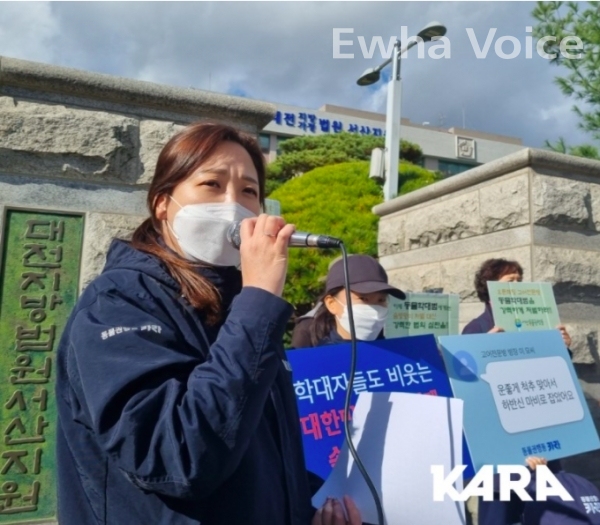
Ever since President Moon Jae-in suggested the possibility of banning the consumption of dog meat in South Korea last September, there have been several heated debates on animal rights.
A survey recently conducted by the Ministry of Agriculture, Food and Rural Affairs shows an estimate of 6.38 million households raising pets in South Korea, eight percent higher than the previous year. Despite the growing interest in animals, Korea’s Animal and Plant Quarantine Agency presented alarming statistics showing that an average of 130,000 animals is abandoned each year. The overall situation in South Korea has led animal rights groups and others to suggest that such continuation of abandoning animals and dog meat consumption severely endangers animals’ lives and violates animal rights.
Korea Animal Rights Advocates (KARA), a non-profit organization supporting animal rights for nearly 20 years, is a leading advocate of animal protection laws. Jeon Jin-kyung, director of KARA and Ewha Womans University alumna, stressed the importance of strengthening appropriate animal protection laws and promoting discussions about abandoned animals and animal rights.
Jeon explained that South Korea’s animal protection act indeed improved significantly in ways such as individuals who abuse animals are sentenced to a maximum of three years in prison or fined 30 million won. Yet, it still lacks laws that punish people’s arbitrary killing of animals and recognize animals’ legal status under the constitution. She elaborated that problems like dog meat consumption and deep-rooted hatred against stray cats make improving animal rights in South Korea even more challenging.
“In comparison to other Asian countries like Thailand where it bans the consumption of dog meat and China where it reclassified dogs from ‘livestock’ to ‘companion animals,’ South Korea is lagging behind in its animal protection laws,” Jeon said. “Animal protection must be formally declared as a national duty under the constitution and Civil Code amendments that state ‘animals are not objects’ must pass rapidly.”
According to Jeon, KARA plans to actively focus on supporting broad-scale policies that outlaw dog meat as food, relocate stray cats to redeveloped areas, and protect stray dogs and cats in so-called “food dog” farms. In the future, KARA will zero in on the protection and rights of farm animals like cows — which KARA regards as the most chronic structural animal cruelty problem.
Jeon mentioned the easiest way people can protect animals and their rights is to refrain from purchasing animals from pet shops that mass-produce, commercialize, and sell animals. People can also stay updated on animal rights by following the social media accounts of animal protection groups like KARA and signing petitions for law amendments. There is also a growing movement of people taking direct action by volunteering at local animal shelters that care for abandoned animals and inadvertently raising the profile of animal rights in South Korea.
“Please spread the word around you that ‘buying a pretty baby animal is espousing the commercialization of animals and hindering the progress of protecting abandoned animals,’” she said. “Do not forget that even at this moment, there are animals that are sold and thrown away like commodities based on the liking and disliking of humans. We must not allow these animals to lose their precious lives to a euthanasia injection.”
Foreigners living in South Korea also show support for the subtle changes in the country’s enforcement of animal rights. Celine Galindo Bena, an exchange student in the Department of Economics at Ewha, was not surprised to hear that some Koreans consume dog meat. She attributes this to differences in culture. However, she believes that it is necessary to make changes in laws if there is a shift in culture and social construct over time.
“The ban on dog meat consumption shows that society has changed compared to its past in the sense that ingesting animals, generally identified as pets, should be condemned,” Bena said. “If this new social construct is better adapted and widely accepted in the new Korean society, I believe the law should be promoted.”

